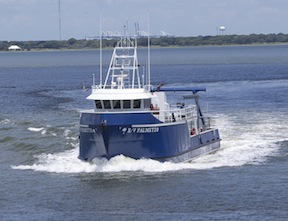(CHESAPEAKE, Va.) — R/V Palmetto, a fisheries research vessel operated by the South Carolina Department of Natural Resources (SCDNR), was recently repowered with new eco-friendly fuel-efficient engines from Volvo Penta.
The vessel underwent a major overhaul at the Metal Trades shipyard near Charleston, S.C., and was put back into service in July. As part of the overhaul project, the original 1980s-era diesels were replaced by a pair of new Volvo Penta D16 MH600 Tier 3 engines with ZF W650 gears. The installation also included state-of-the-art electronic controls and a 7-inch display screen in the wheelhouse.
Superior Diesel, Volvo Penta’s authorized Power Center in Charleston, oversaw the repower project and will also be responsible for maintenance and 24/7 service for the engines. A major factor in the selection of Volvo Penta engines in the competitive tender process was the size of the engines, especially height, according to Jim Reed, sales manager for Superior Diesel. “Many comparable competitors’ engines were disqualified because of their height. The taller engines would have required major alterations to the engine room. The Volvo Penta D16s fit nicely into the engine space with room to spare. In fact, since the new engines were installed, the chief engineer and I joked that there would be room for a ping-pong table in the empty space in the engine room.”
Originally built in 1982 as an offshore supply vessel for the Gulf Coast oil industry, Palmetto was acquired by SCDNR in 1987 and converted for its new role as a fisheries management vessel. The 110-foot vessel conducts fishery and oceanographic surveys from Cape Hatteras to Palm Beach and offshore to 100 miles. The ship carries a crew of five and up to nine scientists.
“The fuel efficiency provided by the new Volvo Penta engines will contribute to considerable savings in operating costs and increase endurance time on station,” said Robert Boyles, deputy director of the Marine Resources Division, SCDNR. “In addition, it will be much cleaner burning — an important factor for a vessel dedicated to conserving natural resources.”
“Since the repower with Volvo Penta, the vessel has trimmed its fuel consumption by at least 45 percent, burning 40 gph at cruising speed. With the new Volvo Penta engines, they will also be able to extend oil service intervals up to 1,000 hours. The older engines were real fuel guzzlers. The crew and scientists will breathe easier on deck without diesel fumes, and will also appreciate the quieter operation,” said Reed.
For more information, visit www.volvopenta.com.

